Related Research Articles
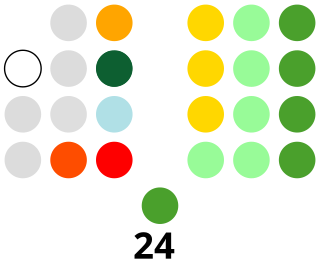
The Congress of the Philippines is the legislature of the national government of the Philippines. It is bicameral, composed of an upper body, the Senate, and a lower body, the House of Representatives, although colloquially, the term "Congress" commonly refers to just the latter. The Senate meets at the GSIS Building in Pasay, while the House of Representatives meets at the Batasang Pambansa in Quezon City, which also hosts joint sessions.

The People Power Revolution, also known as the EDSA Revolution or the February Revolution, were a series of popular demonstrations in the Philippines, mostly in Metro Manila, from February 22 to 25, 1986. There was a sustained campaign of civil resistance against regime violence and electoral fraud. The nonviolent revolution led to the departure of Ferdinand Marcos, the end of his 20-year dictatorship and the restoration of democracy in the Philippines.
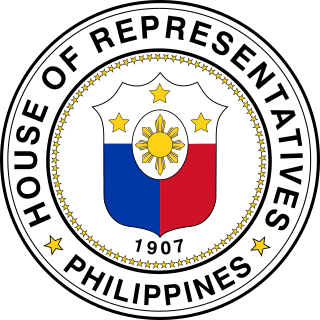
The House of Representatives is the lower house of Congress, the bicameral legislature of the Philippines, with the Senate of the Philippines as the upper house. The lower house is commonly referred to as Congress, although the term collectively refers to both houses.

The Batasang Pambansa, often referred to simply as the Batasan, was the legislature of the Philippines, established as an interim assembly in 1978 and later as an official body in 1984. It was the fourth unicameral legislature in Philippine history. Members of the Batasang Pambansa were referred to as "Mambabatas Pambansa", shortened to "MP".
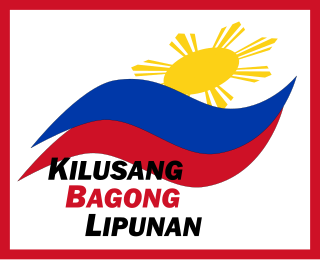
The New Society Movement, formerly named the New Society Movement of United Nationalists, Liberals, et cetera, is a right-wing political party in the Philippines. It was first formed in 1978 as an umbrella coalition of parties supporting then-President Ferdinand E. Marcos for the Interim Batasang Pambansa and was his political vehicle during his 20-year regime. It was reorganized as a political party in 1986, and is the furthest to the right of the political spectrum among active parties after Marcos' ouster.
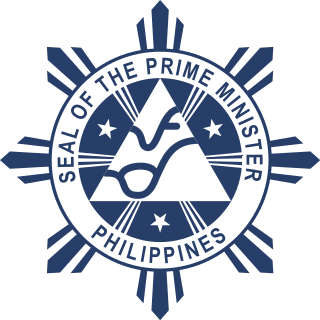
The prime minister of the Philippines was the official designation of the head of the government of the Philippines from 1978 until the People Power Revolution in 1986. During martial law and the fourth republic, the prime minister served as the head the Armed Forces of the Philippines. A limited version of this office, officially known as the President of the Council of Government, existed temporarily in 1899 during the First Philippine Republic.

The State of the Nation Address is an annual address by the president of the Philippines to a joint session of the Congress of the Philippines. Mandated by the 1987 Constitution, the speech is delivered on the fourth Monday of July at the Plenary Session Hall of the Batasang Pambansa Complex in Batasan Hills, Quezon City.
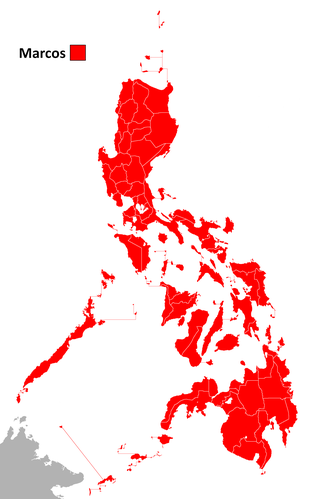
The 1981 Philippine presidential election and national referendum was held on June 16, 1981. President Ferdinand E. Marcos of the Kilusang Bagong Lipunan (KBL) defeated retired general and World War II veteran Alejo Santos of the Nacionalista Party in a landslide victory. Most opposition parties boycotted the election as a sign of protest over the 1978 election for the Interim Batasang Pambansa, which they condemned as fraudulent. At the same time, a national referendum was held on the question in holding elections for barangay elections in 1982.

Ramon Villarosa Mitra Jr. was a Filipino statesman, diplomat, and pro-democracy activist. He served as speaker of the House of Representatives of the Philippines from 1987 to 1992. Prior to that, he was Corazon Aquino's first minister of Agriculture from 1986 to 1987, a member of the Batasang Pambansa from 1984 to 1986 and a senator during the 7th Congress.
A parliamentary election was held in the Philippines on April 7, 1978, for the election of the 165 regional representatives to the Interim Batasang Pambansa. The leading opposition party, the Lakas ng Bayan (LABAN), ran twenty-one candidates for the Metro Manila area. Their leading candidate was the jailed opposition leader Ninoy Aquino. Marcos regime's party known as the Kilusang Bagong Lipunan (KBL), which was led by the then-First Lady Imelda Marcos. Ninoy was allowed to run by his fellow partymates under the Liberal Party, who boycotted the election and was not allowed to campaign, and so his family campaigned for him. The night before the election on April 6, 1978, a noise barrage was organized by the supporters of (LABAN) which occurred up to dawn.
A parliamentary election was held on May 14, 1984, in the Philippines. Like past elections, charges of bribery, protests and complaints on irregularities marred the elections. Former Manila Times publisher Chino Roces and former senator and opposition leader Jose W. Diokno supported the campaign boycotting the election. The National Movement for Free Elections (NAMFREL) helped mitigate electoral fraud during the election.
The Interim Batasang Pambansa was the legislature of the Republic of the Philippines from its inauguration on June 12, 1978, to June 5, 1984. It served as a transitional legislative body mandated by the 1973 Constitution as the Philippines shifted from a presidential to a semi-presidential form of government.
The legislative districts of Baguio are the representations of the highly urbanized city of Baguio in the various national legislatures of the Philippines. The city is currently represented in the lower house of the Congress of the Philippines through its lone congressional district.
The legislative districts of Cotabato are the representations of the province of Cotabato in the various national legislatures of the Philippines. The province is currently represented in the lower house of the Congress of the Philippines through its first, second, and third congressional districts.

Arnulfo Palma Fuentebella was the Speaker of the Philippine House of Representatives from 2000 to 2001. He was born in Camarines Sur to former governor Felix Fuentebella. He graduated in the University of the Philippines and later became a banker. He later represented of the 3rd district of Camarines Sur, more popularly known as the Partido district. He became the speaker for a year before Fuentebella was de-seated.

Gemiliano "Mel" Campos Lopez Jr. was a Filipino politician who served as the 18th Mayor of Manila from 1988 to 1992 and as OIC - Mayor of Manila from 1986 to 1987 and an assemblyman of the Batasang Pambansa of the Philippines from 1984 to 1986. He was also a former chairman of the Philippine Sports Commission from 1993 to 1996 and the Philippine National Oil Corporation from 2010 until his death in 2017.

Conrado Favis Estrella Sr. was a Filipino politician. He served as the Governor of Pangasinan from 1954 to 1963 and Secretary and Minister of the Department of Agrarian Reform from 1971 to 1986. He was the grandfather of Abono Rep. Robert Raymond Estrella and former Pangasinan Rep. Conrado Estrella III.

Raul Aguila Daza is a Filipino lawyer, certified public accountant, and politician, who served in the House of Representatives of the Philippines for 20 years as Representative of the 1st District of Northern Samar. Although he could still seek another term under the term-limit provisions of the Constitution, at 86 he chose not to stand for re-election in the 2019 national elections. He was also a three-term governor of the same province from 2001 to 2010; the Representative of the Lone District of Northern Samar from 1969 until the declaration of martial law in 1972.

Leonardo Balagot Perez was a Filipino politician who served as a member of the Philippine House of Representatives on behalf of the province of Nueva Vizcaya. He was a member of the Senate of the Philippines, and served in the cabinet of President Ferdinand Marcos.
Joaquin Joaquino Ortega was a Filipino politician who was the first civil governor of the province of La Union. His tenure marked the centuries long presence of the Ortega political family in the affairs of the province.
References
- 1 2 Sotelo, Yolanda (May 1, 2013). "112-year political journey of the Ortegas of La Union". Philippine Daily Inquirer. Retrieved December 11, 2024.
- ↑ Sotelo, Yolanda (August 26, 2015). "Cracks in La Union's Ortega clan show". Philippine Daily Inquirer. Retrieved December 11, 2024.
- ↑ Turner, Mark (1989). "Elites and Power in a Philippine Town Under Martial Law, 1972-76" (PDF). Philippine Studies. 37 (3). Ateneo de Manila University: 289. Retrieved December 11, 2024.
- 1 2 "Roster of Philippine legislators". House of Representatives of the Philippines. Archived from the original on March 16, 2017. Retrieved April 17, 2020.
- ↑ "Our Governors". Province of La Union Official Website. Archived from the original on August 21, 2014. Retrieved December 11, 2024.
- ↑ Gurtiza, Joy Ann. "PGLU Honors Legacy of Don Joaquin J. Ortega, Commemorates his 122nd Appointment as Province's First Civil Governor" . Retrieved December 11, 2024.
- ↑ Acosta, Primitivo. "History". LGU Bangar, La Union. Retrieved December 11, 2024.